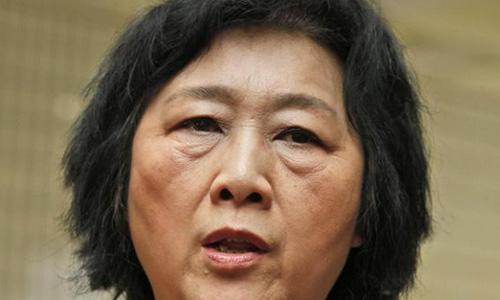China upholds conviction of journalist, 71, grants parole: lawyer
China on Thursday gave medical parole to a 71-year-old journalist jailed for "leaking" an official document warning against liberal political ideas, her lawyer said, after a conviction condemned by free speech advocates.
Beijing's high court ruled that veteran journalist Gao Yu will receive treatment outside prison for a "serious illness," her lawyer Mo Shaoping told AFP.
Gao will be able to spend time with her family but could later return to prison to serve the rest of her five year sentence, Mo added.
Earlier dozens of police officers blocked access to the court, which after an appeal upheld Gao's jailing for "leaking state secrets," but reduced her original seven year sentence by two years.
Gao -- in custody for 18 months -- was in April this year convicted of leaking a directive by the ruling Communist Party warning against the "dangers" of multiparty democracy.
Dated 2013, "Document Number 9", also condemns universal definitions of human rights and criticism of the party's historical record, according to copies widely circulated online.
A Hong Kong media outlet denied obtaining the report from Gao, who has suffered heart problems during her detention.
"Because she is at an advanced age and has a serious illness, that she can serve her term outside prison, at home, is a good thing," Mo said.
But he added: "Serving a sentence at home is not like being a free person", referring to legal requirements that she be kept under surveillance.
State security prevented foreign journalists and about ten diplomats from standing near the court which issued the appeal verdict Thursday, bundling away a woman who shouted slogans in support of Gao.
China's official Xinhua news agency confirmed the parole and said the sentence reduction was made because Gao had "expressed guilt" during her appeal hearing, held in secret.
But Mo referred to the admission as a "bargain".
China's Communist-controlled courts have a near-100 percent conviction rate, with most guilty verdicts based on alleged confessions extracted from suspects.
- Crackdown on dissent -
A former winner of UNESCO's World Press Freedom Prize, Gao has been a consistent critic of the ruling Communist Party's authoritarian policies.
Her appeal earlier this week came as China's President Xi Jinping oversees a crackdown on dissent that has seen hundreds of lawyers, activists and academics detained in recent years, with dozens jailed.
China's already close controls on the media have been further tightened, reporters say.
France-based Reporters Without Borders ranked China 176th out of 180 countries in its 2015 Press Freedom Index.
Gao's jailing was condemned by human rights groups, while Washington called for her immediate release and the EU demanded Beijing review her trial.
Amnesty International on Thursday repeated a call for Gao's unconditional release.
Asked about international criticism of the appeal verdict, Chinese foreign ministry spokesman Hong Lei said at a regular briefing: "China's justice departments dealt with the case and reached a decision in accordance with the law."
A consistent advocate for democracy and free speech, Gao was imprisoned following the government crackdown on student protests in Tiananmen Square in 1989.
Her political writings saw her jailed again for six years in the 1990s, also on a charge of "leaking state secrets".
She was detained once more last May in the lead-up to the Tiananmen crackdown's 25th anniversary, and shown by state broadcaster CCTV making a "confession" under police detention, an increasingly regular spectacle in China.
Related Posts

